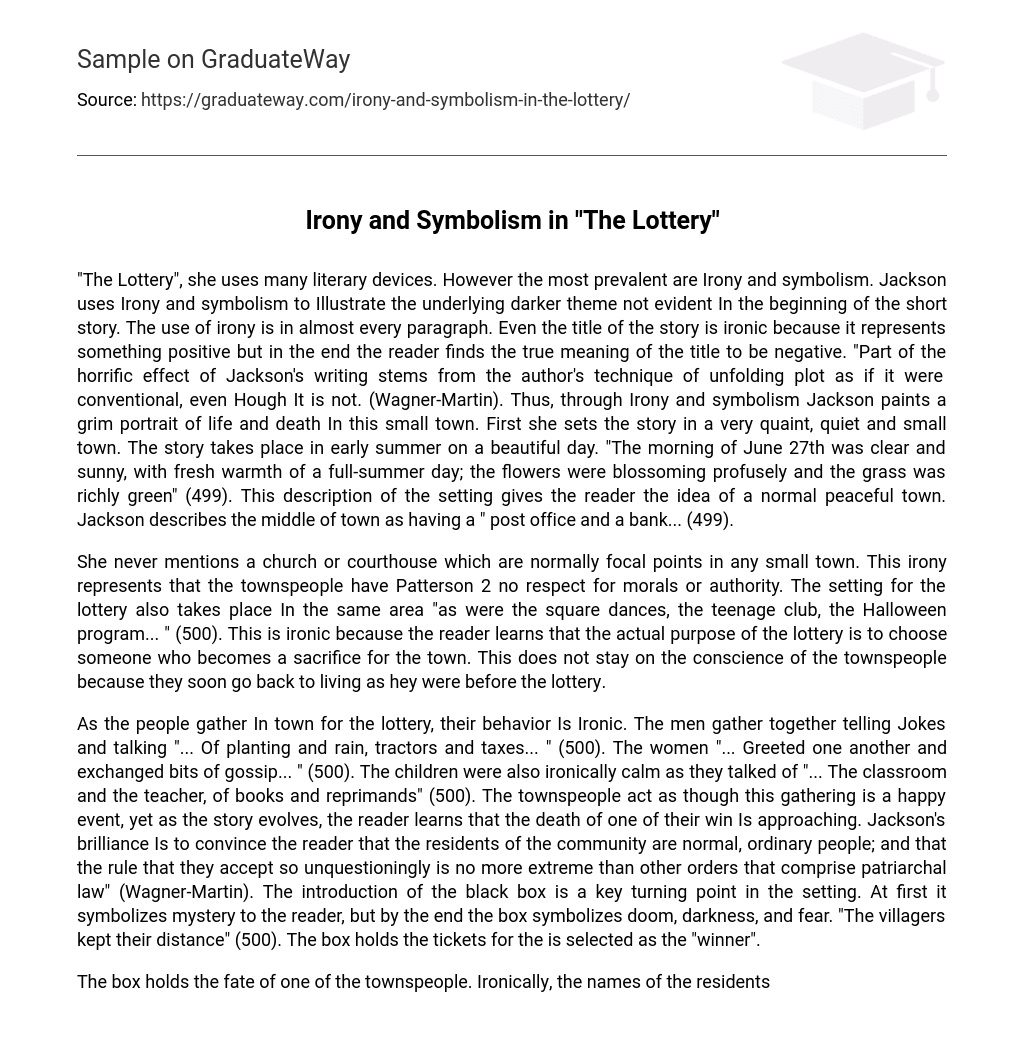In “The Lottery,” the author employs various literary devices, with irony and symbolism being the most prominent. Jackson utilizes these devices to convey the hidden dark theme that is not apparent at the beginning of the story. Irony permeates nearly every paragraph, even extending to the ironic title of the story, which initially suggests something positive but ultimately reveals a negative meaning. As Wagner-Martin notes, Jackson’s technique of unfolding the plot in a seemingly conventional manner, despite its unconventionality, adds to the horrific impact of her writing. Through irony and symbolism, Jackson creates a bleak portrayal of life and death in a small town. She first establishes the story in a charming and peaceful small town, depicted as quaint and tranquil. The narrative unfolds on a beautiful summer day, described as clear and sunny with abundant blossoming flowers and lush green grass. The center of town is portrayed as having a post office and a bank (499).
The absence of any mention of a church or courthouse in the small town represents the townspeople’s lack of respect for morals and authority. Interestingly, the lottery takes place in the same area where other social activities occur, such as square dances, teenage clubs, and Halloween programs. It is ironic because the true purpose of the lottery is to select someone to be sacrificed for the town. However, this sinister act does not seem to trouble the conscience of the townspeople, as they quickly return to their normal lives after the lottery.
As the people gather in town for the lottery, their behavior is ironic. The men gather together telling jokes and talking about planting, rain, tractors, and taxes. The women greet one another and exchange bits of gossip. The children are also ironically calm as they talk about the classroom, the teacher, books, and reprimands. The townspeople act as though this gathering is a happy event, yet as the story evolves, the reader learns that the death of one of their own is approaching. Jackson’s brilliance is to convince the reader that the residents of the community are normal, ordinary people; and that the rule they accept so unquestioningly is no more extreme than other orders that comprise patriarchal law (Wagner-Martin). The introduction of the black box is a key turning point in the setting. At first, it symbolizes mystery to the reader, but by the end, the box symbolizes doom, darkness, and fear. “The villagers kept their distance”. The box holds the tickets for whoever is selected as the “winner”.
The box contains the destiny of one of the local residents. Interestingly, the names of the individuals themselves predict the forthcoming event. The lottery is led by Mr. Summers and Mr. Graves. Mr. Summers’ name reminds one of the flourishing season full of vitality and attractiveness. On the other hand, Mr. Graves’ name evokes thoughts of demise and gloom. Both names carry symbolic meanings. Even as the townspeople revel in the bountifulness of summer, a fresh burial will become part of the community. Strangely enough, the townspeople embrace this as an inevitable aspect of life in their town.
By employing descriptive passages, Jackson guides the reader to perceive the narrative as a tale of luck. However, at the story’s conclusion, the employment of irony and symbolism unveils a sinister and lethal community. The seemingly ordinary and mundane aspects of life turn horrifying once the reader comprehends that the lottery does not actually reward a victor. Instead, the chosen ballot designates an individual who must sacrifice everything by forfeiting their own life. This final and ultimate irony within Jackson’s work brings forth the evident presence of malevolence throughout the entire story.





